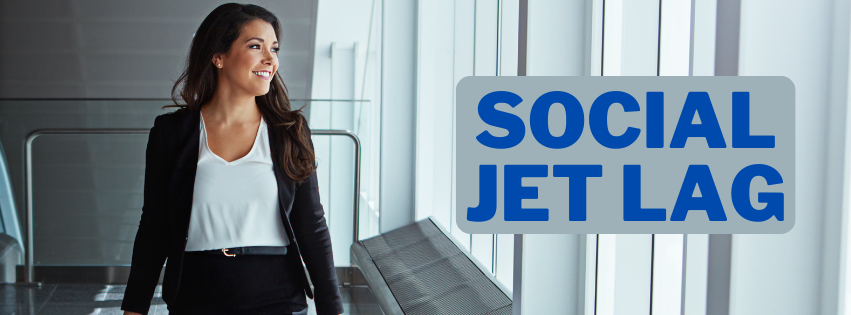Understanding Social Jet Lag: A Sleep Educator’s Guide
By Lauri Leadley, Founder & President, Sleep Educator at Valley Sleep Center
Social jet lag refers to the misalignment between an individual’s biological clock (circadian rhythm) and their social clock, which is determined by social obligations, such as work schedules, school timings, or social activities. It occurs when individuals must wake up and sleep earlier or later on workdays compared to their natural sleep patterns on non-workdays, such as weekends or holidays. This misalignment can lead to symptoms like those experienced after long-distance travel across time zones, such as fatigue, irritability, difficulty concentrating, and impaired performance. It’s particularly common in individuals with irregular work schedules, such as shift workers, or those who have late-night social engagements but must wake up early for work or other responsibilities. Chronic social jet lag has been associated with various health issues, including obesity, cardiovascular problems, and mood disorders.
In the realm of sleep health, we often discuss the importance of maintaining a consistent sleep schedule and aligning our rest patterns with our body’s natural circadian rhythm. However, there’s a lesser-known phenomenon that can wreak havoc on our sleep quality and overall well-being: social jet lag. As a sleep educator, it’s crucial to shed light on this concept and its implications for our health.
Social jet lag occurs when there’s a misalignment between our biological clock, which regulates our sleep-wake cycle, and our social obligations, such as work, school, or social activities. Just like the jet lag experienced after traveling across multiple time zones, social jet lag disrupts our body’s internal clock, leading to a host of negative consequences.
Imagine this scenario: you diligently follow a consistent sleep schedule during the workweek, waking up early for your job and hitting the hay at a reasonable hour. However, when the weekend rolls around, you throw caution to the wind, staying up late with friends and sleeping in until noon. While this deviation from your weekday routine may seem harmless, it can actually disrupt your circadian rhythm and induce social jet lag.
One of the primary culprits behind social jet lag is irregular sleep patterns. Shift workers, for example, often experience social jet lag due to their ever-changing work schedules, which force them to sleep at odd hours. Similarly, students who pull all-nighters to cram for exams or young adults who stay out late partying can also fall victim to social jet lag.
The consequences of social jet lag extend far beyond mere fatigue and grogginess. Research has linked chronic social jet lag to a myriad of health issues, including obesity, diabetes, cardiovascular disease, and mood disorders. Disrupting our body’s natural sleep-wake cycle can throw off important physiological processes, such as hormone regulation and metabolism, contributing to these adverse health outcomes.
As a sleep educator, it’s essential to equip individuals with strategies to mitigate social jet lag and prioritize their sleep health. Encourage them to establish a consistent sleep schedule, even on weekends, to minimize disruptions to their circadian rhythm. Emphasize the importance of creating a sleep-friendly environment, free of electronic devices and other distractions, to promote quality rest.
Additionally, advocate for the adoption of healthy sleep habits, such as practicing relaxation techniques before bedtime and avoiding caffeine and alcohol close to sleep. By empowering individuals to prioritize their sleep health and align their social activities with their body’s natural rhythm, we can mitigate the detrimental effects of social jet lag and pave the way for better overall well-being.
In conclusion, social jet lag poses a significant threat to our sleep health and overall wellness. As a sleep educator, it’s our responsibility to raise awareness about this phenomenon and provide individuals with the tools they need to combat it. By fostering a culture of sleep prioritization and promoting healthy sleep habits, we can help individuals reclaim control over their sleep and live happier, healthier lives.


